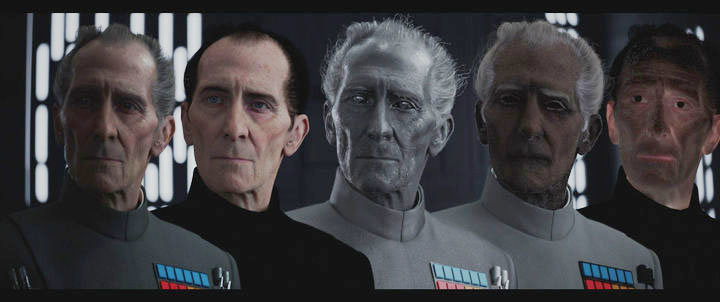This article was previously published in Watch The Skies (I’ve been meaning to get it out here for a while now).
Rogue One is the latest installment of the Star Wars saga. It was the number one movie for a number of weeks. It will be remembered as a landmark film – particularly for visual effects. The effects are simply amazing. If you haven’t seen Rogue One yet, please consider yourself warned that I may spoil part of the film for you. I don’t think it’s particularly “spoilery” but some people might disagree.
Grand Moff Tarkin is in the movie.
How is that possible? I hear you ask, the actor that played his part in the original film died in 1994. It’s true. Peter Cushing, an actor with more than 130 film credits and star of many of the Hammer horror films did indeed pass away at the age of 81 back in 1994. Now, through the magic of visual effects he’s back on screen and acting again.
I’d like to tell you that was as much science fiction as the rest of the film franchise, but it’s not. We have landed firmly in a time when a person may be inserted into a picture, or a film and they don’t actually have to be there (or even alive) for that to happen. We can take footage of any person – however famous and change what their faces and voices do on screen.
Let that sink in for a moment.
If this were only about science fiction movies I don’t think it would be nearly the big deal that it is. Unfortunately the state of voice and image manipulation has reached a point where people can create an entire speech from a mere sampling of video that can be found on YouTube or from a digital creation of somebody that’s been dead for more than twenty years. There is no need for the person’s approval. There is no easy way to be certain what has been doctored and what has not been doctored. So far the people doing these things have been in the entertainment industry and have had the blessing of the actors or their estates. What if they didn’t?
I don’t want to seem alarmist about this technology. I actually like that Tarkin’s in the movie. It makes sense for the story. They had permission from the estate to do that (and presumably the estate got paid).
What if this tech was applied to a fake news story during an election cycle? What if it was applied to a public safety alert that wasn’t real? Think how people reacted to the broadcast of War of the Worlds. We have recently seen just how much money and how much influence supposed news sites can have on the average internet user. There are dozens upon dozens of stories that have no basis in fact that continue to swirl around the net. Now couple with that somebody being able to take the face swap technology and create fake news using old news conference footage and you have a recipe for a genuine disaster. Users – who might have a lower ethical standard than the folks at ILM, or who might have a specific agenda they want to push – can create anything they want and make it believable to the point of being impossible to refute without professional assistance. Want to say that Tom Cruise has admitted to being the second gunman in the Kennedy assassination? That can totally happen and the film footage and voice are becoming more and more believable. It will look like him and sound like him.
I really enjoyed Rogue One. The special effects were amazing. This will be a film that is noted in history for what it has done. My hope is that notability stays in the entertainment industry and is not the harbinger of something far more dangerous.
Go and see face swap and hear about voice additions/corrections:
https://petapixel.com/2016/03/21/face-swap-technology-getting-creepy/
https://www.engadget.com/2016/11/06/adobe-experiment-adds-words-to-recordings/
Article from Yahoo!
Watch some background on making the effects happen:
http://io9.gizmodo.com/watch-how-ilm-brought-back-tarkin-and-leia-for-rogue-on-1790812003

